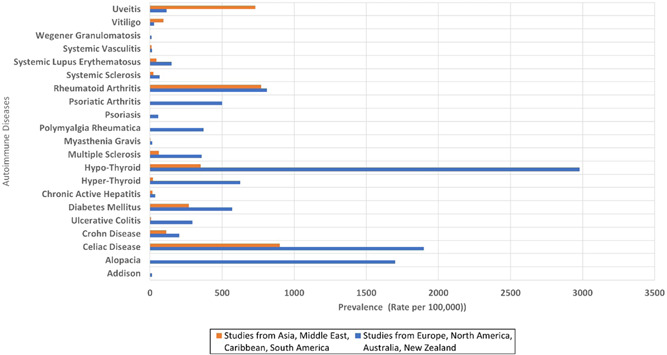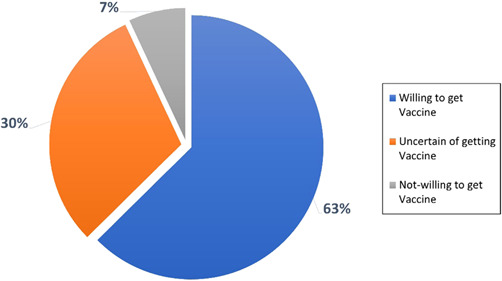Dear Editor,
We recently read articles addressing the concerns of patients with autoimmune disorders, highlighting a lack of evidence on the pros and cons of the newly developed coronavirus disease 2019 (COVID‐19) vaccines in this population. 1 On the other hand, this pandemic worsens day by day, with total confirmed cases reaching 123 million as of March 21, 2021, and a death toll of 2.7 million so far.2, 3 Dreadfully, most robust healthcare systems are finding it hard to cope with the pandemic of COVID‐19.4, 5, 6, 7 The only way to reduce the socioeconomic burden of COVID‐19 and the strain on healthcare systems is to achieve herd immunity against SARS‐CoV‐2. 1 Vaccine, one of the most promising public health measures, seems to offer a ray of expectation of ending the pandemic through herd immunity. To achieve herd immunity, it was projected that about 60%–100% of the worldwide population should be vaccinated, depending on the efficacy of the vaccines used. 8
In autoimmune disorders, the body's immune system is already hyperactive, and damages own body cells comprising more than eighty inflammatory disorders, as shown in Figure 1.9, 10 Autoimmune diseases can be characterized by the presence of auto‐antibodies and enhanced inflammatory response due to decreased immune tolerance and dysregulated immune system, resulting in organ damage. 11 The emergence of the COVID‐19 pandemic raised concerns of severe outcomes in patients on immunosuppressive therapy; first, the high risk of being infected and second, the risk of developing severe clinical implications. 12 SARS‐CoV‐2 can induce an intense immune response in immunocompromised patients that may significantly impact the vaccine development approach against the virus. 13
Figure 1.

Geographical distribution of autoimmune diseases worldwide 9
The broader spectrum of interactions between autoimmune disorders and SARS‐CoV‐2 is uncertain; in addition, the mechanism underlying this relationship is still poorly understood. According to the EULAR COVID‐19 database, approximately 3590 patients with rheumatic diseases were infected with SARS‐CoV‐2 until December 1, 2020, escalating rapidly. 14 The onset of multiple comorbidities and persistent immunosuppressive treatments is exceptional in these patients. 15 In the last few decades, biological and modern synthetic drugs have boosted the therapeutic approach and dramatically enhance disease outcomes. However, the response to certain immunosuppression vaccines, which may result in immunogenicity and B‐cell depletion therapies, has become unpredictable. 16
A recent survey was conducted about vaccine hesitancy on 2887 patients who had different autoimmune disorders, as shown in Figure 2. Curiously, people with inflammatory rheumatoid arthritis were 54.2% eager to get vaccinated, although 13.6% were reluctant to get vaccinated against SARS‐CoV‐2. In autoimmune disease patients, the major reasons for vaccine reluctance are fears regarding adverse effects and the worsening of the underlying autoimmune disease, as reported by other studies. 17
Figure 2.

COVID‐19 vaccine hesitancy in patients with autoimmune diseases due to lack of proper research about their efficacy and safety 17
To reduce the catastrophic effect of COVID‐19 in autoimmune patients, their treatment and management should be prioritized, and SARS‐CoV‐2 vaccination is considered one of the most effective solutions. Conversely, their safety and effectiveness should first be analyzed, and large‐scale studies are carried out considering emerging data. Furthermore, physicians should also strongly advise their patients underlying any autoimmune disorder to endure SARS‐CoV‐2 vaccines, as this can substantially help to minimize associated morbidity and death in COVID‐19.
REFERENCES
- 1. Velikova T, Georgiev T. SARS‐CoV‐2 vaccines and autoimmune diseases amidst the COVID‐19 crisis. Rheumatol Int. 2021;41(3):509‐518. 10.1007/s00296-021-04792-9 [DOI] [PMC free article] [PubMed] [Google Scholar]
- 2. Emergency Situational Updates . 2021. https://www.who.int/publications/m/item/weekly-epidemiological-update---16-march-2021. Accessed March 20, 2021.
- 3.COVID‐19 Coronavirus Pandemic. 2021. https://www.worldometers.info/coronavirus/. Accessed March 20, 2021.
- 4. Awan UA, Khattak AA, Afzal MS, Khan HI, Saqib MAN, Ahmed H. COVID‐19 and tuberculosis overlapping epidemics: a holistic review from Pakistan. J Med Virol. 2021;93(5):2573‐2575. 10.1002/jmv.26714 [DOI] [PubMed] [Google Scholar]
- 5. Awan UA, Zahoor S, Ayub A, Ahmed H, Aftab N, Afzal MS. COVID‐19 and arboviral diseases: another challenge for Pakistan's delipidated healthcare system. J Med Virol. 2020. 10.1002/jmv.26668 [DOI] [PMC free article] [PubMed] [Google Scholar]
- 6. Awan UA, Zahoor S, Rehman K, et al. COVID‐19 and Influenza H1N1: A dangerous combination for Pakistan in the upcoming winter season. J Med Virol. 2020. 10.1002/jmv.26687 [DOI] [PMC free article] [PubMed] [Google Scholar]
- 7. Haqqi A, Awan UA, Ali M, Saqib MAN, Ahmed H, Afzal MS. COVID‐19 and dengue virus co‐epidemics in Pakistan: a dangerous combination for overburdened healthcare system. J Med Virol. 2020. 93:80–82. 10.1002/jmv.26144 [DOI] [PMC free article] [PubMed] [Google Scholar]
- 8. Anderson RM, Vegvari C, Truscott J, Collyer BS. Challenges in creating herd immunity to SARS‐CoV‐2 infection by mass vaccination. Lancet. 2020;396(10263):1614‐1616. 10.1016/S0140-6736(20)32318-7 [DOI] [PMC free article] [PubMed] [Google Scholar]
- 9. Cooper GS, Bynum ML, Somers EC. Recent insights in the epidemiology of autoimmune diseases: improved prevalence estimates and understanding of clustering of diseases. J Autoimmun. 2009;33(3‐4):197‐207. [DOI] [PMC free article] [PubMed] [Google Scholar]
- 10. Theofilopoulos AN, Kono DH, Baccala R. The multiple pathways to autoimmunity. Nat Immunol. 2017;18(7):716‐724. 10.1038/ni.3731 [DOI] [PMC free article] [PubMed] [Google Scholar]
- 11. Boekel L, Hooijberg F, van Kempen ZLE, et al. Perspective of patients with autoimmune diseases on COVID‐19 vaccination. Lancet Rheumatol. 2021;3(4):e241‐e243. 10.1016/S2665-9913(21)00037-0 [DOI] [PMC free article] [PubMed] [Google Scholar]
- 12. Robinson PC, Bursle EC. Management of autoimmune disease during the COVID‐19 pandemic. Aust Prescr. 2020;43(5):146‐147. 10.18773/austprescr.2020.058 [DOI] [PMC free article] [PubMed] [Google Scholar]
- 13. Liu Y, Sawalha AH, Lu Q. COVID‐19 and autoimmune diseases. Curr Opin Rheumatol. 2021;33(2):155‐162. 10.1097/BOR.0000000000000776 [DOI] [PMC free article] [PubMed] [Google Scholar]
- 14.EULAR COVID‐19 Database. 2020. https://www.eular.org/eular_covid19_database.cfm. Accessed 19‐12‐2020.
- 15. Misra DP, Agarwal V, Gasparyan AY, Zimba O. Rheumatologists' perspective on coronavirus disease 19 (COVID‐19) and potential therapeutic targets. Clin Rheumatol. 2020;39(7):2055‐2062. [DOI] [PMC free article] [PubMed] [Google Scholar]
- 16. Baker D, Roberts C, Pryce G, et al. COVID‐19 vaccine‐readiness for ocrelizumab and other anti‐CD20‐depleting therapies in multiple sclerosis and other autoimmune diseases. Clin Exp Immunol. 2020;202(2):149‐161. [DOI] [PMC free article] [PubMed] [Google Scholar]
- 17. Felten R, Dubois M, Ugarte‐Gil MF, et al. Vaccination against COVID‐19: expectations and concerns of patients with autoimmune and rheumatic diseases. Lancet Rheumatol. 2021;3(4):e243‐e245. 10.1016/S2665-9913(21)00039-4 [DOI] [PMC free article] [PubMed] [Google Scholar]


